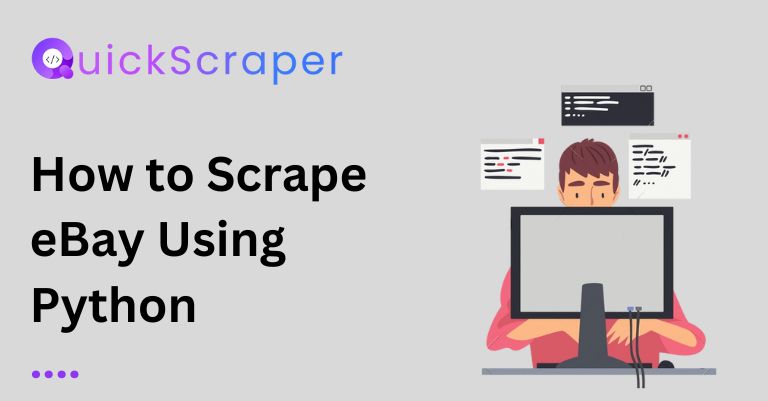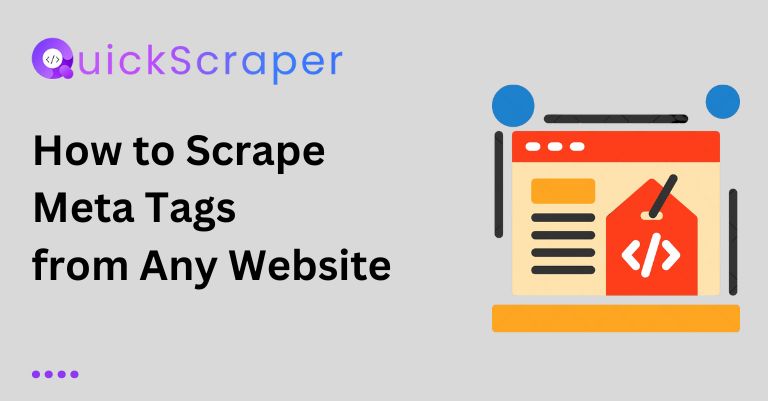
How to Scrape Any Website Using PHP
How to Scrape Any Website Using PHP Do you hate manually copying and pasting data from websites? With web scraping, you can automate the process

A web scraper extracts structured data from websites automatically through an automated process. With the right tools and knowledge, you can unlock a wealth of valuable information from platforms like eBay, one of the world’s largest e-commerce marketplaces. Here we will explore a Python script that can scrape data from eBay’s search results in real time, giving you the ability to analyze, research, and build data-driven strategies.
The provided code utilizes popular Python libraries like BeautifulSoup and Requests to parse HTML and make HTTP requests. We’ll break down the script line by line, explaining its functionality and highlighting potential improvements to handle pagination, implement anti-scraping measures, and optimize data storage. By the end of this post, you’ll have a comprehensive understanding of how to use this script effectively to scrape eBay’s product data while adhering to best practices for ethical and responsible web scraping.
You can install the required libraries using pip:
pip install beautifulsoup4 requests
The Code Breakdown:
import requests
from bs4 import BeautifulSoup
import csv
import json
We start by importing the necessary modules: requests for making HTTP requests, BeautifulSoup for parsing HTML, csv for saving data in CSV format (optional), and json for saving data in JSON format (optional).
access_token = 'L5vCo54nB7p1J8fZNh' #access_token = Get your access token from app.quickscraper.co
The code you provided uses an access token from the QuickScraper API to bypass eBay’s anti-scraping measures. You’ll need to obtain your own access token by creating an account on the QuickScraper website (https://app.quickscraper.co).
url = f"<https://api.quickscraper.co/parse?access_token={access_token}&url=https://www.ebay.com/sch/i.html?_nkw=mobile>"
print(url)
In this section, we construct the API URL that includes our access token and the target eBay URL. The _nkw parameter specifies the keyword we want to search for (in this case, “mobile”).
response = requests.get(url)
html_content = response.content
soup = BeautifulSoup(html_content, 'html.parser')
We use the requests.get() function to fetch the HTML content of the eBay search results page via the QuickScraper API. We then pass the response content to the BeautifulSoup constructor to create a parsed HTML object (soup).
productItems = soup.find_all('li', class_=['s-item','s-item__pl-on-bottom'])
products = []
for product in productItems:
title = product.find('span', role=['heading']).text.strip() if product.find('span', role=['heading']) else None
subTitle = product.find('div', class_=['s-item__subtitle']).text.strip() if product.find('div', class_=['s-item__subtitle']) else None
price = product.find('span', class_=['s-item__price']).text.strip() if product.find('span', class_=['s-item__price']) else None
url_element = product.find('a', {'class': 's-item__link'})
url = url_element.get('href') if url_element else None
foundItem = {
"title": title,
"subTitle": subTitle,
"price": price,
"url": url,
}
products.append(foundItem)
In this portion, we use BeautifulSoup to extract relevant data from the HTML. We find all the li elements with the classes 's-item' and 's-item__pl-on-bottom', which represent individual product listings.
For each product listing, we extract the title, subtitle, price, and product URL by navigating through the HTML structure using BeautifulSoup’s find() method and CSS selectors.
We store the extracted data in a dictionary (foundItem) and append it to the products list.
with open("products.json", "w") as file:
json.dump(products, file, indent=4)
Finally, we save the extracted product data to a JSON file named products.json using the json.dump() function. The indent=4 parameter makes the JSON output more human-readable.
Potential Improvements: While the provided code works for scraping a single page of eBay search results, there are several potential improvements you can consider:
_pgn parameter in the API URL.Even when using the QuickScraper API, it’s essential to be mindful of eBay’s anti-scraping measures and terms of service. Always review and comply with eBay’s policies to ensure your scraping activities are ethical and legal.
Implement best practices such as respecting robots.txt, rotating IP addresses and User-Agents, adding delays between requests, handling errors gracefully, and limiting data collection to only what is necessary.
With the Python script provided, you can effectively scrape product data from eBay’s search results and save it as a JSON file. Remember to implement appropriate anti-scraping measures, handle errors gracefully, and respect eBay’s terms of service to ensure your scraping activities are responsible and ethical.

How to Scrape Any Website Using PHP Do you hate manually copying and pasting data from websites? With web scraping, you can automate the process

How to Scrape Meta Tags from Any Website Meta tags are snippets of text that describe a website’s content, and search engines use them to

How to Scrape Images from Any Website Scraping images from websites can be a useful technique for various purposes, such as creating image datasets, backing

How to Scrape a Website Without Getting Blocked: A Developer’s Guide Web scraping, as a powerful tool, is beneficial for developers, giving them the power

How To Scrape Yelp Data using Python Web scraping is the process of extracting data from websites automatically. In this blog post, we’ll learn

How to Scrape Stock Prices Every Day using Python In this blog post, we will learn how to scrape stock prices from a financial website
By clicking “Accept”, you agree Quickscraper can store cookies on your device and disclose information in accordance with our Cookie Policy. For more information, Contact us.